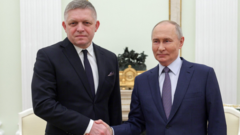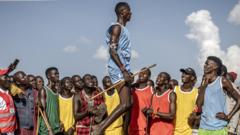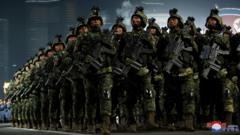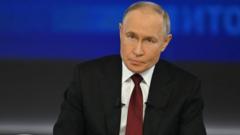The alarming rise in reported executions of Ukrainian POWs by Russian forces raises serious humanitarian and legal concerns. Human rights organizations and Ukrainian prosecutors are investigating these crimes, which appear to be part of a broader policy, highlighting the urgent need for accountability within the Russian military.
Rising Concerns Over Executions of Ukrainian POWs by Russian Forces

Rising Concerns Over Executions of Ukrainian POWs by Russian Forces
Reports have emerged detailing the execution of numerous Ukrainian prisoners of war (POWs) by Russian forces, prompting investigations and calls for accountability amid growing fears of systematic war crimes.
The ongoing war between Russia and Ukraine has seen disturbing reports regarding the treatment of prisoners of war (POWs), particularly Ukrainian soldiers captured by Russian forces. The execution of Oleksandr Matsievsky, a Ukrainian sniper, has become emblematic of this tragic trend. Captured in the early days of the invasion, Matsievsky's execution was recorded on video, where he was seen smoking a cigarette and proclaiming "Glory to Ukraine!" moments before he was shot. This incident is part of a disturbing pattern; Ukrainian prosecutors have confirmed that at least 147 Ukrainian POWs have been executed by Russians since the war escalated in full scale last year, with a significant increase in reported cases this year.
Recent investigations by Ukrainian authorities also uncovered additional cases, including the shooting of nine soldiers in the Kursk region and confirmed reports of beheadings. Videos of these extrajudicial killings have surfaced, complicating efforts to ascertain their exact locations due to a lack of distinctive landmarks in the footage. Human rights organizations are examining these incidents closely, noting a troubling trend in the systematic nature of the killings that suggests clear directives may exist within the Russian military command.
Despite these grave allegations, the Russian government maintains that its forces have upheld the provisions of international law regarding POWs. However, the lack of investigation into reports of POW executions has raised eyebrows among human rights advocates. Rachel Denber of Human Rights Watch emphasized the need for accountability, questioning the directives issued to Russian troops regarding POW treatment and highlighting a pervasive culture of impunity.
Conversely, while Ukrainian forces have also faced accusations of executing Russian POWs, these claims are considerably fewer, suggesting a mismatch in adherence to wartime conduct on both sides. Ukrainian officials assert that they take such allegations seriously and are conducting investigations in line with international standards.
As the humanitarian crisis unfolds, the stories of families affected by these incidents highlight the personal tragedies linked to war. Mothers and loved ones are left with devastating uncertainty, fearing for the lives of captured individuals, like Ruslan Holubenko, who expressed his fears of torture should he surrender.
The international community watches closely as these events unfold, raising critical questions about adherence to the Geneva Conventions and the broader implications of war crimes allegations amidst the ongoing conflict.



















